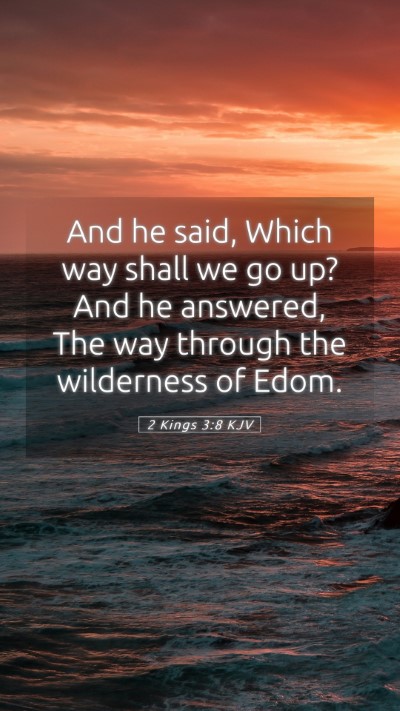Understanding 2 Kings 3:8 - A Comprehensive Bible Verse Commentary
The verse 2 Kings 3:8 states, "And he said, Which way shall we go up? And he answered, The way through the wilderness of Edom." This passage unfolds in the context of King Jehoram of Israel seeking counsel from the Prophet Elisha regarding a military campaign against Moab.
Verse Meaning and Interpretation
The following insights provide a deeper understanding of this verse through the perspectives of esteemed public domain commentaries:
-
Matthew Henry’s Commentary:
Henry emphasizes the importance of seeking direction from God. Jehoram's query about the route signifies the lack of guidance from the Israelite leaders. Henry notes that the wilderness of Edom represents a troubling path, highlighting the challenges one might face in endeavors led without spiritual leadership.
-
Adam Clarke’s Commentary:
Clarke provides historical and geographical insights, explaining how the path through Edom was treacherous and filled with uncertainty. He emphasizes that the choice of this route reflects both desperation and a reliance on Divine providence, indicating that such journeys may be daunting but are ultimately guided by faith.
-
Albert Barnes’ Commentary:
Barnes focuses on the governance of Judah in this situation. He remarks that Jehoram's inquiry about the way demonstrates wisdom in consulting God through Elisha. This act of seeking counsel emphasizes the need for divine insight and the necessity of turning away from idol worship, which had led Israel astray.
Contextual Historical Analysis
To fully grasp the verse’s significance, it is essential to consider the historical backdrop. King Jehoram ruled Israel amidst ongoing conflicts and idol worship that plagued the Israelites. His decision to seek counsel from a prophet indicates a pivotal moment of faith amid national crisis.
Theological Insights
2 Kings 3:8 invites theological reflection regarding the relationship between leaders and divine guidance. Here, Jehoram’s inquiry illustrates a broader biblical principle: leaders are meant to seek God in all decisions, especially when faced with adversity. This reliance is a theme found throughout the Old Testament.
Cross-References
Further scripture that enriches understanding of 2 Kings 3:8 includes:
- 1 Samuel 28:6: Highlights Saul's futile inquiry for guidance from God.
- 2 Chronicles 20:20: Offers a context of seeking direction from God before engaging in battles.
- Proverbs 3:5-6: Encourages trust in the Lord and reliance on His understanding for guidance.
Application of the Verse in Daily Life
This verse is not merely a historical account but also carries timeless principles applicable today:
- Seeking Guidance: Like Jehoram, individuals today should seek divine direction in challenging times, recognizing that earthly wisdom is often inadequate.
- Facing Difficult Paths: The wilderness represents life's trials; navigating these with faith can lead to spiritual growth and success.
- Consultation with God: Regular prayer and scripture study are foundational practices for those wishing to align their decisions with God’s will.
Conclusion
In summary, 2 Kings 3:8 encapsulates essential themes of divine guidance, the role of leadership, and the faith required to traverse uncertain paths. The insights from various commentaries enhance understanding of this verse, making it a valuable passage for both personal and communal Bible study.
Further Study Resources
For those interested in expanding their study of this verse, consider using various Bible study tools and resources such as:
- Bible study groups for shared insights
- Online Bible study platforms for guided learning
- Bible study guides and lessons focused on leadership and divine consultation
By applying the principles found in 2 Kings 3:8, believers can cultivate a deeper understanding of Scripture and its application in their lives, all the while fostering a connection to God's guidance through faith.


